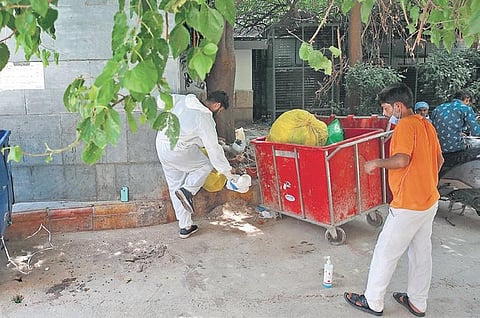

COVID-19 entered India from two places – Delhi and Mumbai. It has to come from an international airport since it’s a foreign virus. Delhi is certainly a hub for healthcare for north India. It’s not surprising that the amount of biomedical waste generated in Delhi is huge.
"We have institutes like AIIMS, RML Hospital, Gangaram Hospital, the maximum expertise on the subject, the maximum caseload here...we are the epicentre of the problem,” says Environmentalist Jai Dhar Gupta, reacting to the latest data that Delhi is top on the list of generating biomedical waste during COVID. In a report submitted to the Supreme Court, the Environment Pollution (Prevention and Control) Authority (EPCA) stated that Delhi daily generated 349 tonnes biomedical waste in July.
The report is based on the data shared by the Central Pollution Control Board and state pollution control boards of Delhi, Haryana, Uttar Pradesh (UP) and Rajasthan, and Delhi has the highest daily share of biomedical waste generation.
“Of course, hospitals are the major generators due to the rise in COVID cases, but there are also a lot of COVID-positive cases that have been home quarantined. The modality is they have to give their COVID-19 waste in yellow bags and then there is a collection system that is facilitated as per the CPCB’s June guidelines. But most of the households are mixing the waste. So, it’s not just the COVID waste but also the general household bags, which is then taken to the bio medical waste operator,” says Delhi-based waste management expert Swati Singh Sambyal.
Experts believe non-segregation of waste at source due to lack of awareness is one of the prominent reasons behind this.
“These bags comprising mixed waste don’t get opened, and are directly put into the incineration plants,” she shares. The quantity went up from 25 tonnes per day in May to 372 tonnes per day in June, which then fell to 349 tonnes per day in July in Delhi, as per the data. Sourabh Manuja, Fellow, Environment and Waste Management Division, TERI, says, “Even Wuhan had recorded six times higher waste generation during COVID. And a Medanta doctor also reported that they generate 15 times more waste as compared to a normal patient. Doctors in the COVID wards have to change their PPE kits several times a day because there are no air conditioners.”
Experts say that the government has introduced guidelines for quarantine centres, that their waste has to be recycled through certain processes and everything doesn’t need to be incinerated.
“A general plant has the capacity to treat 2,000 tonnes per day. But these are not meant to handle biomedical waste. Even when we talk of biomedical waste handling facilities, the syringes and face shields do not go to incinerators. They are sterilisied, shredded, and disposed off. So, it’s ok to incinerate the infected waste but it’s not wise. Moreover, we are reaching the peaks and we might fall short of the capacities in the days to come,” he adds.
Delhi has two common biomedical treatment facilities that can collectively handle 74 tonnes of such waste, which means that the waste generated is way more than what can be disposed of.
“Delhi has its own by laws for solid waste management in place since 2017, which mandate segregation into three parts – wet, dry and domestic hazardous waste. The way ahead would be enforcing and strengthening segregation at source. If you do not segregate, the risk of infection to workers also increases,” says Sambyal. Even though all this bio-hazardous waste and PPEs is disposable and is made with some version of plastic, Gupta feels we don’t have a choice at this point in time.
“As an environmentalist, I would say all this plastic is going to show up in our food, water and air in the decades to come. But as a human being I say it is our life over the environment and anything else.”
In a nutshell
In a report submitted to the Supreme Court, the Environment Pollution (Prevention and Control) Authority (EPCA) stated that Delhi daily generated 349 tonnes biomedical waste in July; the highest in the country